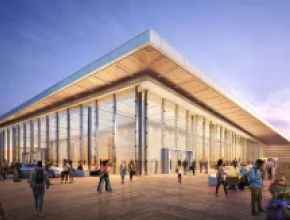Let’s face it: We work in an industry that’s an “alphabet soup” of acronyms and initialisms. We love us some catchy, if sometimes opaque, abbreviations!
But for a lot of young professionals trying to break into the meetings and events industry, one of the main barriers to entry can be the niche acronyms that industry veterans throw out on a regular basis. Abbreviations like “CMP,” “MICE” or “CVB” may seem second-nature to many long-serving meetings professionals, but for newer entrants, they can be confusing.
Following are some of the most-used industry acronyms, abbreviations and initialisms, what they stand for and why they are important.
Think we missed an important industry acronym or abbreviation? Send us an email at logan.pratt@meetingstoday.com to have your acronym and definition considered for this list.
[New to the meetings industry? Check out our Gen Z column for some useful tips!]
ASAE
ASAE stands for the “American Society of Association Executives” and is an organization that represents association professionals. Known as the “center for association leadership,” ASAE provides resources, education and networking opportunities for those in associations and produces a variety of events for leaders in the association industry. Its most well-known event is its “Annual Meeting & Exposition” held every year around mid-August in a popular North American meetings destination.
BEO
BEO stands for "Banquet Event Order" and are documents that describe the catering needs of a meeting or event. BEOs are focused on food and beverage (F&B) and are how a planner describes to a catering company, hotel or other venue what the food and beverage needs are for a particular event. This can include the order of events, menus, equipment, staffing or other special requests.
CEU
CEU stands for “Continuing Education Credits,” which are part of the requirements meeting professionals must meet in order to apply for the CMP exam. There are certain requirements that must be met before you are allowed to apply for the CMP exam, however. You must first garner 36 months of relevant experience in the meetings industry (or 24 months if you have a college degree in event management or hospitality) as well as 25 hours of “continuing education” (or CEU) credits over a period of five years. Meetings Today offers these continuing education credits as part of our webinars, which can be viewed live or on-demand for CMP CEU credits.
CMP
CMP stands for “Certified Meeting Professional” and is a designation created and awarded by the Events Industry Council (EIC) as a way to “enhance the knowledge and performance of meeting professionals, promote the status and credibility of the meeting profession and advance uniform standards of practice.” To gain the title of CMP, you first must pass the Event Industry Council’s CMP exam, which is offered during four “testing windows” each year (January, May, August and November). There is also a subspeciality of the CMP program for meeting professionals in the healthcare industry called “CMP-HC.”
CSR
Similar to ESG, CSR stands for “Corporate Social Responsibility” and is the idea that companies and organizations have a responsibility to give back to the communities they conduct business in. Many companies often try to incorporate CSR into their meetings or events by giving back to their meeting destination, perhaps by having employees volunteer in the community as a scheduled part of the event. Oftentimes, companies will produce CSR-focused events in order to meet their ESG goals. CSR has also been formalized in programs such as the United Nations Global Compact, where businesses voluntarily agree to support 10 principles in the areas of human rights, labor, the environment and anti-corruption.
[Click here to read more about sustainability in meetings and events]
CVB
CVB stands for “Convention and Visitors Bureau” and is an organization that represents a particular destination and helps to promote tourism and travel to the area. This often includes business travel and meetings. Many CVBs can be helpful (and free!) resources for meeting planners who don’t live in the destination they are planning in. CVBs are often the first point of contact for event planners looking to find out more about a destination’s hotels, convention centers, restaurants or offsite activities.
DEI
DEI stand for “diversity, equity and inclusion” and is an umbrella term for any programs, initiatives or policies put in place by a company to help create a diverse, equitable and inclusive environment that respects and accommodates every individual regardless of gender, culture, ethnicity, religion, disability, class, age, sexual orientation or opinion.
Diversity refers to the presence of individuals with different identities, equity refers to treating all of those individuals fairly and with an equal amount of respect, and inclusion refers to an organization creating an environment where people of all identities can thrive and feel welcomed as their authentic selves.
Although DEI is the most popular term used by organizations and individuals, there are many DEI-adjacent acronyms and abbreviations that organizations may use instead of DEI, but typically refer to the same general principles. These include EDI (Equity, Diversity and Inclusion), DEIB (Diversity, Equity, Inclusion and Belonging), JEDI or EDIJ (Justice, Equity, Diversity and Inclusion) and DEIA (Diversity, Equity, Inclusion and Accessibility)
DI
DI stands for “Destinations International” and is the largest organizational resource for CVBs, DMOs and tourism boards. Destinations International represents over 6,000 individuals among 575 destinations worldwide and provides educational resources, networking opportunities and other marketing benefits. It is well known for its “Annual Convention” typically taking place sometime in late July in a popular North American destination.
DMC
DMC stands for “Destination Management Company,” which are third-party businesses hired by destinations to work directly with meeting and event planners and have expertise specifically in planning events and activities in an area. DMCs can be partners that planners discover via DMOs, hotels or hired directly by meeting planners. While CVBs and DMOs might be concerned with overall tourism for a destination, a DMC works primarily with meeting and event planners to provide local knowledge and insight about a particular destination. Another important distinction is that DMCs may charge a fee, although DMCs may also provide more tailored and specific information and guidance for planners than a CVB or DMO. While the roles of CVBs, DMOs and DMCs may have some overlap, their roles in destination management may differ from destination to destination, but one or all of these organizations are crucial in the meeting planning process.
[Click here to learn more about Meetings Today's destination coverage]
DMO
DMO stands for “Destination Marketing Organization.” CVBs and DMOs are often used interchangeably, but there are a few distinguishing factors between them. Some destinations may prefer to call themselves a CVB while others prefer DMO, but they nearly always refer to the same thing. Some in the industry consider “CVB” to be a bit outdated, especially in reference to the “Bureau” part of the acronym, and so prefer “DMO” to remain modern in their language. Another important distinction is that some destinations may not have a convention center, rendering the “Conventions” in “convention and Visitors bureau” inaccurate. In these cases, meeting professionals may default to “DMO” to be inclusive of all destinations, regardless of their convention center status.
EIC
EIC stands for the “Events Industry Council” and is a non-profit collection of over 30 membership organizations, 19,500 firms and over 103,500 individuals involved in the events industry. Some of these membership organizations include US Travel Association, IMEX, Encore, Cvent, MPI, PCMA, SITE, ESPA and more. EIC is also responsible for creating, upholding and organizing the Certified Meeting Professional (CMP) and CMP-HC certification programs.
ESG
ESG stands for “Environmental, Social and Governance” and refers to a set of principles or standards that refer to a “stakeholder-centric” approach to business that places people and local communities ahead of a company’s financial success. ESG encompasses anything a company does that impacts those external to the organization. For instance, a company focusing on sustainability or “green” meetings is likely attempting to meet their ESG goals. Or a company pledging a philanthropic donation to a local charity during one of their events. Meetings and events are not only great places for companies to announce ESG initiatives but are also good ways for companies to practice ESG on a broader scale.
F&B
“F&B” stands for “food and beverage” and refers to bar or catering services that many meeting and event planners incorporate into their events. Many meeting planners will often request F&B rates and catering options in their RFPs, as many properties where a meeting or event is held can help provide F&B. BEOs also help describe the particular F&B needs a planner might have to a catering company, hotel or venue that is hosting the event.
[Click here to read more about F&B]
IAEE
IAEE stands for the “International Association of Exhibitions and Events” and is the most popular association in the global exhibition and trade show industry. IAEE represents over 12,000 members across 50 countries who are all involved in the planning, management and production of exhibitions or trade show events. IAEE also produces its annual “Expo! Expo!” networking and education event sometime in early December at a popular United States destination.
ICCA
ICCA stands for the “International Congress and Convention Association” and serves as a community and resource for those in the international association and governmental meetings industry. Headquartered in Amsterdam, ICCA offers associations across the world education, connections, tools and resources to help them organize more effective and successful meetings. It also helps produce an annual ICCA Congress networking event typically held sometime in the fall at a popular international destination.
IMEX
More of an abbreviation than an acronym, IMEX stands for “Worldwide Exhibition for Incentive Travel Meetings and Events,” and is part of “IMEX Group,” the organization responsible for producing IMEX America and IMEX Frankfurt, two of the most highly attended global trade shows in the industry. Both IMEX shows feature free education sessions, networking opportunities and exhibitors that include national and regional tourist offices, CVBs, hotels, resorts, conference and exhibition centers, cruise lines, airlines, technology companies and event management specialists. IMEX Frankfurt has been hosting shows since 2002, typically taking place sometime between May and June at the Messe Frankfurt in Frankfurt, Germany. IMEX America has been around since 2011 and typically hosts a show in October.
[Related: All of Our Imex America 2023 Event Coverage In One Place]
KPI
KPI stands for “Key Performance Indicators,” which are one of the main metrics that companies use to track the success of certain initiatives, such as how successful a particular meeting or event was. KPIs can vary depending on the goals of the organization but are often measured via data points and post-event surveys. It is always important to define KPIs before or during the planning process of a meeting or event in order to accurately measure whether the event helped to meet organizational goals. Depending on the type of meeting or event, KPIs will vary, but some can include return on investment (ROI), attendee diversity, revenue per attendee or square foot, social media mentions, etc.
MICE
While most people see the word “mice” and think of the small animal, in our industry, “MICE” stands for “meetings, incentives, conferences and exhibitions” and is a term used to describe what many people know as the “meetings and events industry.” Traditionally, MICE encompasses mostly business events, but there are many leisure or community-driven events that might fall under the “MICE” wing.
MPI
MPI, or “Meeting Professionals International,” is a non-profit organization founded in 1972 and the largest association for meeting and event planners, with over 17,000 meeting professional members and a global community of over 60,000 according to MPI. MPI is made up of several chapters across the U.S. and internationally, each providing a variety of education and networking resources in their local areas. Every year, MPI hosts a variety of events that serve as networking opportunities in the meetings industry, the most prominent of which is MPI’s “WEC” (World Education Conference) event, typically taking place during the summer months at a popular North American destination.
PCMA
PCMA stands for the “Professional Convention Management Association,” which is an association of managers of business events, conferences and conventions. PCMA has its headquarters in Chicago, 17 chapters across North America and over 8,000 members. PCMA is well known for its “Convening Leaders” annual event, focusing on providing networking and educational opportunities to leaders in the business events industry.
[Related: PCMA Convening Leaders 2024 Sets Attendance Record; New Programs Launched]
RFP
An RFP is a “Request for Proposal”, typically written up by a meeting or event planner and presented to potential suppliers, such as a hotel, convention center or catering company. The request for proposal is typically done so the meeting planner can get necessary information from suppliers, such as pricing and logistical questions, in a written format. RFPs are oftentimes the first step in the meeting planning process and can help meeting planners narrow down their supplier options for the event they are planning.
SITE
SITE, or SITE Global, stands for the “Society for Incentive Travel Excellence” and is the leading incentive travel-focused industry association with over 2,500 members and over 25 chapters across the world. SITE hosts a variety of events for its members each year, including SITE Global Conference, which is typically held in February in a popular global meetings destination. SITE also hosts the one-day “Young Leaders Conference” in Las Vegas ahead of “IMEX America” to connect young leaders in the industry to other emerging incentive travel professionals from around the world.
Read this next: A Complete List Of Every Major Meetings Industry Event In 2024







